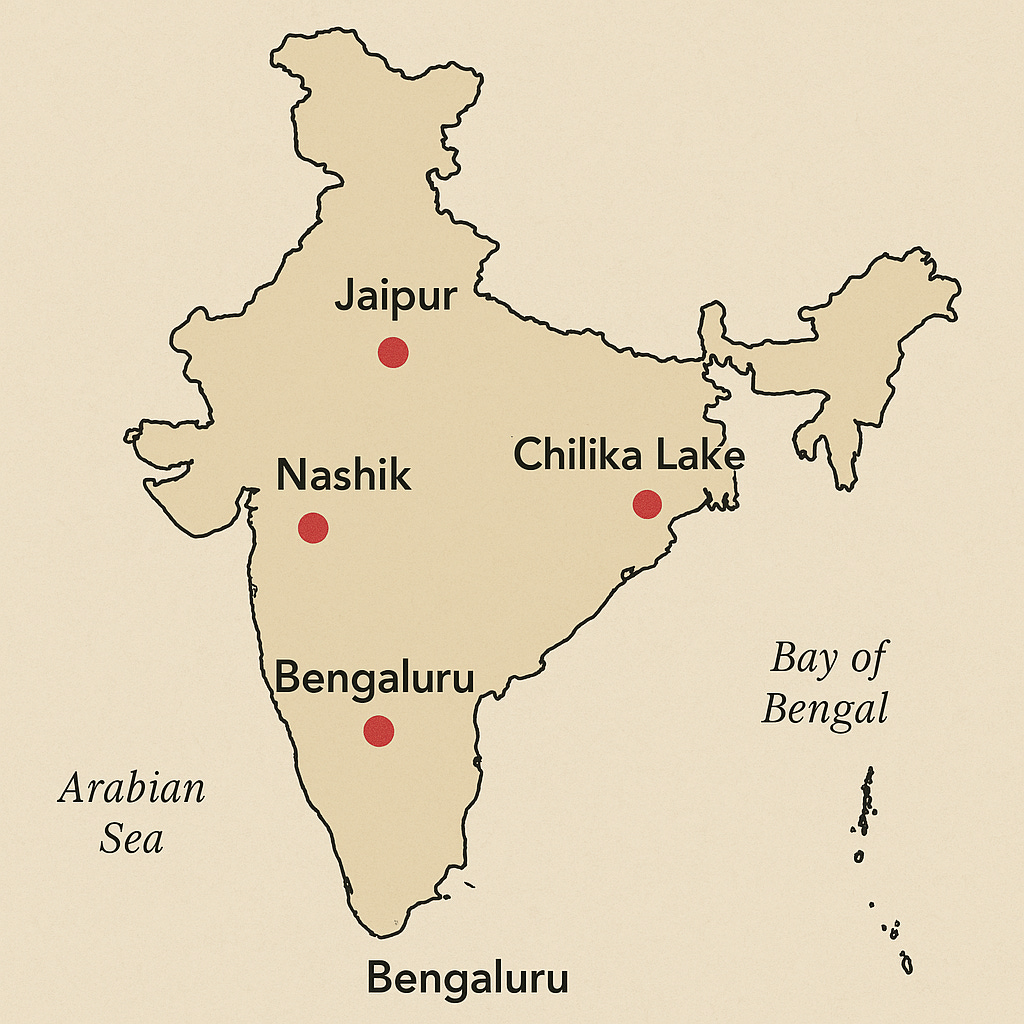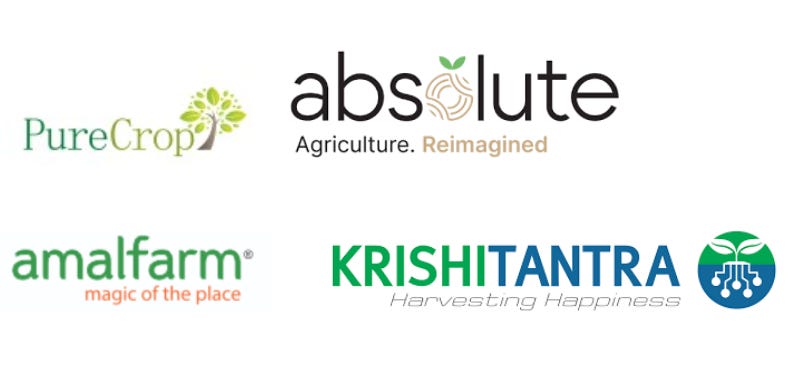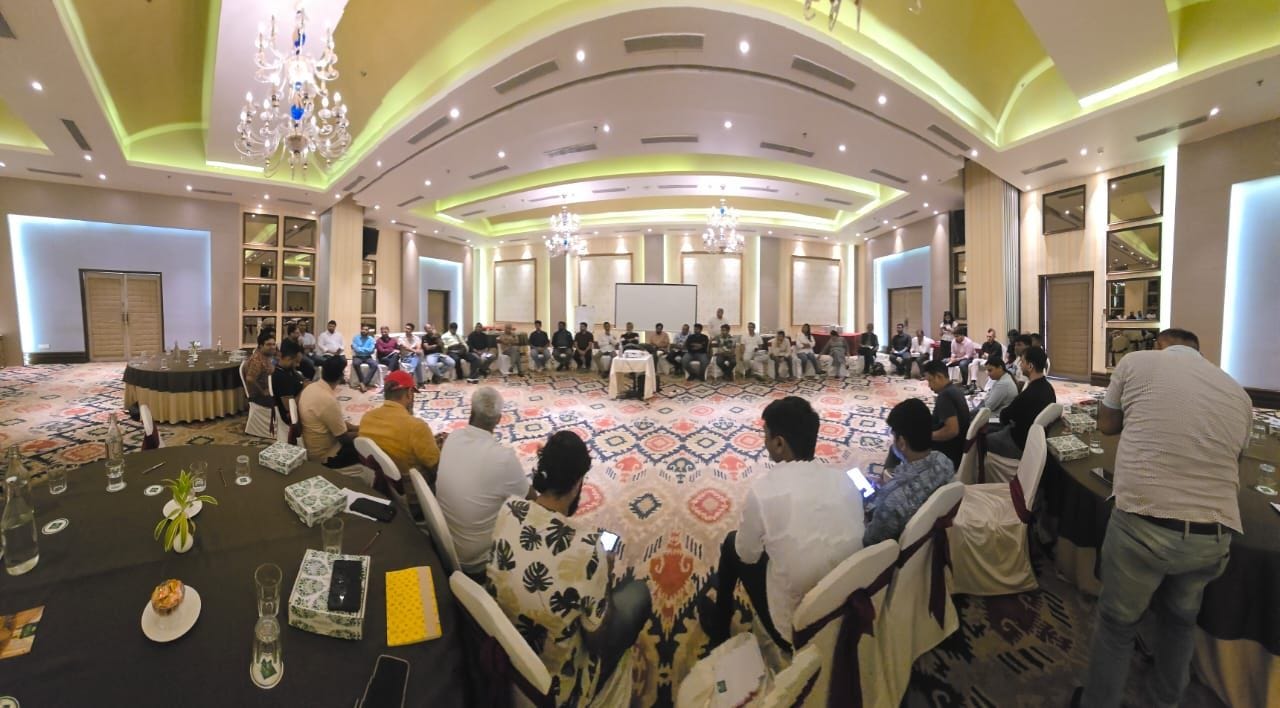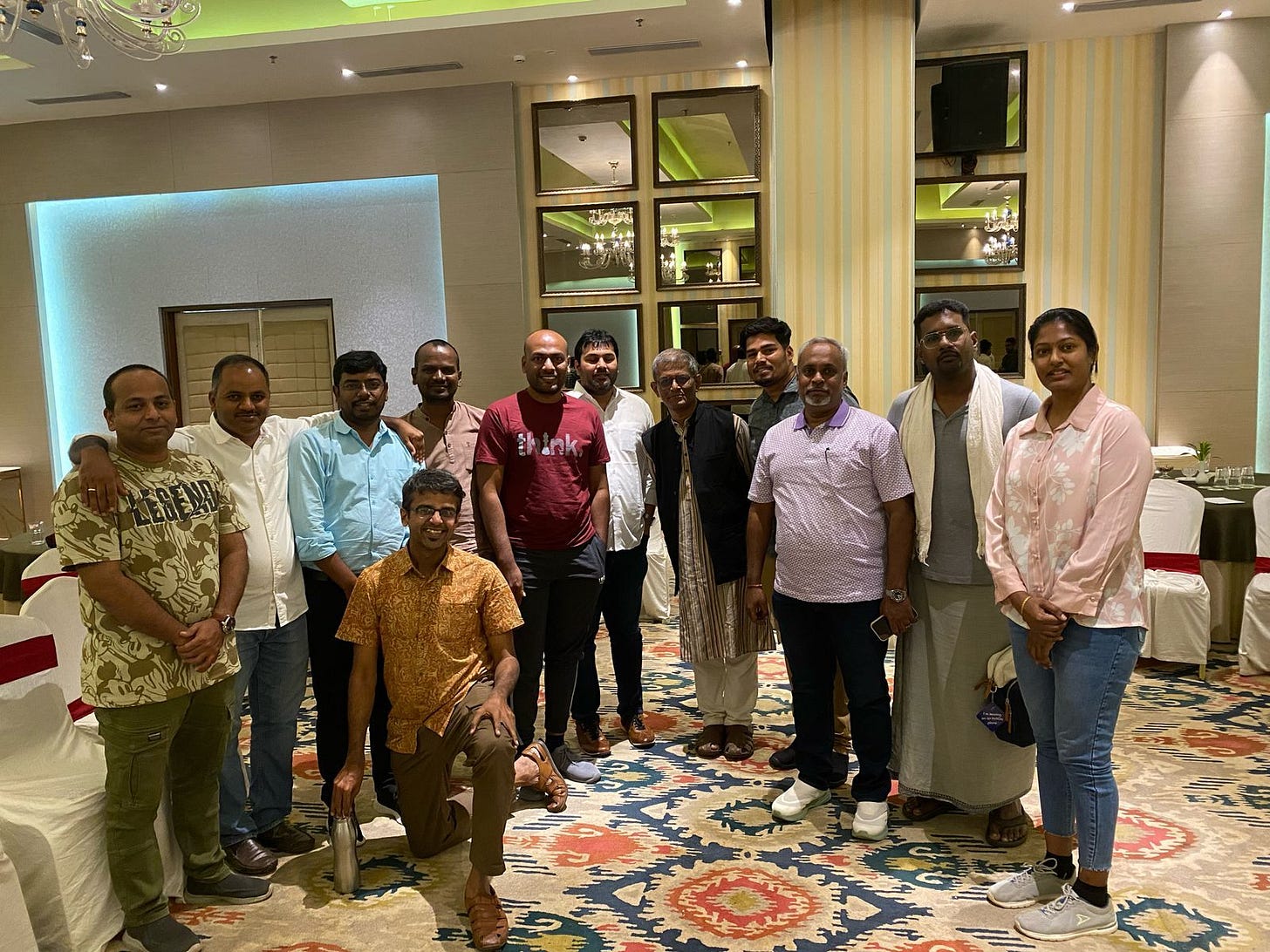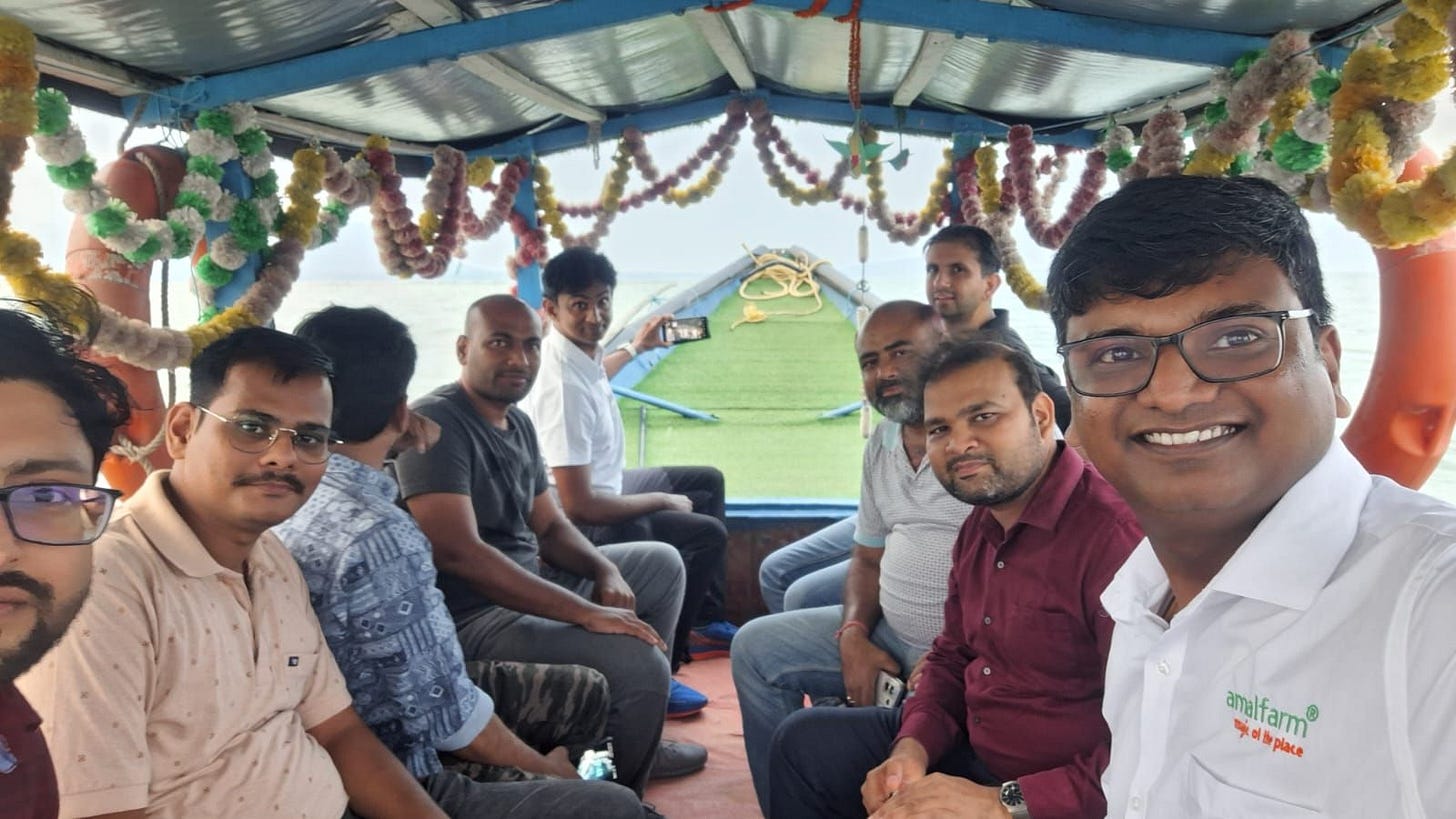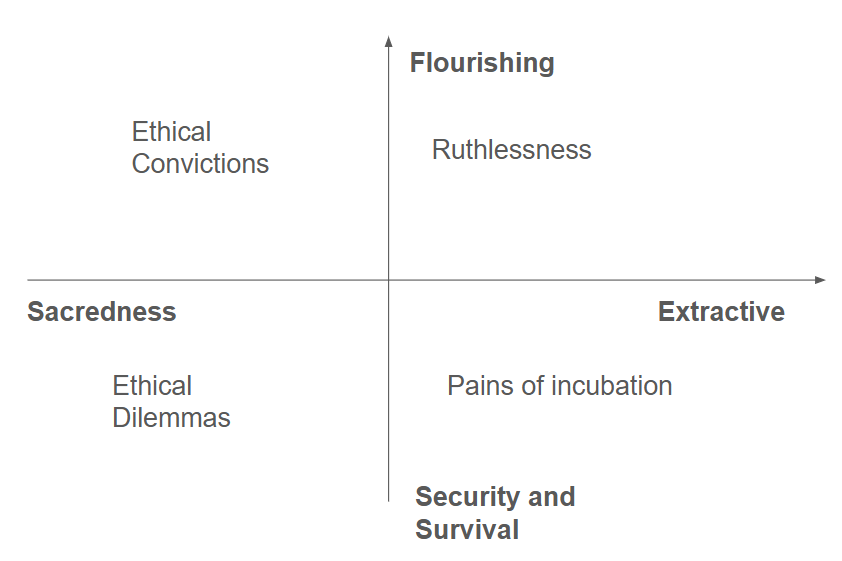Agripreneurs Retreat 4.0
Ethical Dilemmas and Communitarian Possibilities from the Fourth Edition of Agripreneurs Retreat in Eastern Part of India.
In Indic traditions, to complete a circle is considered a significant milestone: The wheels of space-time continuum have returned to its center with a renewed sense of vigor and purpose.
The Parikrama1 ritual which started in January 2024 with the first Agripreneurs retreat in the Western part of India (at Nashik with 25 founders), traveled South (at Bengaluru with 30 founders), walked ambitiously towards the north (at Jaipur with 52 founders) and finally walked East (at Chilika Lake with 57 founders) in April 2025.
One round of Parikrama is now complete. My bhumi - the ground of my subjective reality -now feels different.
The fourth edition of the retreat felt deeply poignant and quickly became emotional as we witnessed those precious moments when a community is being birthed. Venkat who attended the retreat for the second time beautifully summed up its true essence- “These retreats are more than just meetups — they are healing grounds for ideas, ambitions, and emotions.”.
Our local Odisha host KC Mishra and I broke down at the concluding sessions for reasons that feel too sacrosanct to spell out in words here.
The East has been the stepchild of neglect in agrarian and industrial affairs since the days of Green Revolution. This was evident even during the planning phase when there were counterproposals to do this at Mumbai instead of Chilika Lake.
Now that we have ThinkAg announcing an event soon after we announced the Eastern Agripreneurs Retreat, I am glad that we have set the ball rolling. Thankfully, the doggedness to finish the parikrama prevailed and we had an incredible moving experience with the fifty seven founders coming together, in brief liminal moments, as one communitarian organism.
What made this communitarian event endearing was how the process felt communitarian.
Vijay Dhole took up the mantle of being the bride’s father for the guests who congregated and Vinay Nikam took up his shouldering CFO duties. Amrendra Singh helped us with sponsorship. Rahul Prakash brought a beautiful welcome kit for all the participants; KC Mishra got us a beautiful resort booked for the retreat and was the first to suggest Chilika Lake as the venue for the retreat; Dinesh prepared the participants handbook; Shailendra got the website up and running. The retreat’s sponsors (Nishant, Sandeep and Agam and one kind soul who didn’t want to be named) contributed resources simply for the joy of building a community of agripreneurs.
Agritech Startups/Agribusinesses from diverse domains—Goat rearing, Aquaculture, Dairy, Drones, Carbon credits, Food Processing, B2B Export/Import, Solar, Fintech, Dairy Tech, Robotics, Agri Inputs, Full Stack platforms, Hydroponics, Ecommerce, D2C—were all under one roof, openly discussing successes, failures, and lessons learned.
Despite its diversity, what grounded the space was the openness and humility to share no matter who one was and how much revenue one’s business had.
Abhilash Thirupathy who single-handedly upped the fun quotient in the room and made the retreat an extremely personal one (besides his rich agritech experience) captured the gestalt of this organism:
“This was a rare space where:
- A dairy entrepreneur sat next to a soil scientist.
- A goat farmer exchanged notes with a satellite imaging startup.
- A bio-fertilizer founder found resonance with a climate-tech innovator.
What united everyone? A belief that agriculture is the toughest and most meaningful business there is — because it deals with nature, science, and society, all at once.”
My conviction towards the fundamental nature of my work in agritech sector - agritech ecosystem engineering - stems from this source code: Agripreneurs are a fascinating tribe who not only navigate through the triumvirate forces of nature, science and society, but also through the social maze of Samaaj (Society), Sarkaar (Government) and Bazaar (Market).
Three generations of Agripreneurs joined us: First generation traders/agribusiness entrepreneur; Second generation technologists-turned-agritech entrepreneurs (few of them were sons of traders and trading families); Third generation data nerds-scientists - turned-climate tech entrepreneurs.
We had a good representation of entrepreneurs join us from both metropolitan cities and hinterlands. Among the states, Tamizh Nadu took the lead with the biggest cohort.
We had regional entrepreneurs join us from diverse hinterlands of the country, whether it is Erode down south or Nashik in West or Darbhanga and Bhagalpur in Bihar in the East.
Besides sessions on topical themes (fundraise, carbon credits, Plantix and Dvara’s agritech journeys), the highlight of the event was a dialogue on Ethics facilitated by our special invited guest Ramasubramanian Oruganti.
We explored the following questions with the agripreneurs: 1) What are some of the ethical dilemmas you’ve faced at work? 2) What ethical boundaries have you set around your business that you will never trespass?
Here is a participant describing the experience of the ethics session in his own words:
Opening the second day of the retreat with a self-reflective dialogue on Ethics was deeply rewarding. For its echoes were heard all through the day in subsequent sessions, especially during the fundraise discussion session.
Here are few voices that were heard - that contained seeds of ethical dilemmas - as duly documented by Ramasubramanian in his blog post the retreat
1/ Goal Setting: “Majority of our people never define their North Star, this is a serious lacuna, then we become easy prey to drift any which way the industry blows us”.
How can agripreneurs define their True North amidst deep uncertainty in the very nature of farming and agribusiness? What is the lived experience of a True North conviction?
2/ Conflicted personal life: “When I was not an entrepreneur, I adhered to truth, being one now I am forced to lie. I now lie with my spouse as well and that is not a great feeling, I am constantly living with that guilt”. Another voice highlighted this further, "I had to close my startup to rescue my marriage".
We delved into the loneliness of being an entrepreneur. Can the family really understand the pains and struggles a founder goes through? What does it mean to live and support an entrepreneur?
3/ Ruthlessness: “How to be ruthless in business when it does not come naturally for us to be so!”.
If markets are meant to be ruthless, what is the price we are willing to pay for? Should we focus on transforming farmers or should we focus on increasing the pie? When does the former lead to the latter?
4/ Green Value: “I decided that packaging in plastic was for us a boundary we will not cross. I could have grown exponentially if only I had adopted plastic packaging like the rest of my competition. It is an impediment that affects our scaling today”.
What are the ethical tradeoffs in plastic packaging versus glass bottles? We explored how different businesses navigated their ethical boundaries differently based on their unique contexts.
5/ Social Injustice: “It affects me that a farmer toiling for 4 months gets to make 20% profit (if at all) for her efforts and me as a trader dealing with the commodity sometimes for just 4 hours can make 200% on the same”.
Can agripreneurs discover innovative business models in which the overall pie increases while simultaneously transforming the lives of farmers with prosperous livelihoods?
6/ Marketing Strategies: “Many times we are forced to promise a customer something that we do not have ready as yet (because we badly want that customer), it is difficult to maintain that”.
We delved into the moral hazards of selling a promise. Can we develop conviction to stand by truths and sleep peacefully at night while we go through the motions of building an agribusiness?
7/ Bribery: “I have lost business because I am not tuned to catching the hints on bribe by government officials. I do not regret catching it though, but, it feels bad that we have to constantly face this”.
This led to a lot of hand-wrangling on the painful realities of working with the organs of Government - one of the largest vested stakeholder in Indian Agriculture.
8/ Tackling the Investor: “I almost signed the paper, I knew that the deal was unjust, we needed the investment, my staff too was happy. But only I knew that we will compromise our objective. I said ‘no’ and don’t resent it today”. “After much going around, one insight is, it is better to not go to any form of investor, government schemes are far better structured, though difficult to access”. “When we don’t compromise on our values for the investments, eventually we do attract the right kind of investor. It is good to have the clarity on the values”.
How do we navigate investor’s expectations? How do we select the right investor ? How do we make this arranged marriage happen? This conversation was a fascinating array of learning for everyone in the group.
As I shared my reflections and the dilemmas of the Agripreneurs Retreat with my Yoga Mentor Raghu, he mapped a beautiful quadrant that navigated the geography of these ethical quandaries.
Can the community help agripreneurs discover the special zone where flourishing and sacredness meet?
What we could have done better? We didn’t do a great job in making the space gender inclusive. 5% of the participants were women. We also could bring in more folks from humanities and non-profits sector next time.
A lot of exciting possibilities are now emerging now that the Agripreneurs community is alive and kicking in powerful ways: There are talks to setup a founder’s fund. The retreat WhatsApp group is buzzing with founders sharing the partnerships that are emerging from the retreat. The community members are proposing newer locations (including Kashmir) to conduct the next retreat.
This community gives me immense hope. If we can unlock this community’s highest potential, the future of Indian Agriculture is bright! I am excited to give my best shot!
So, what do you think?
How happy are you with today’s edition? I would love to get your candid feedback. Your feedback will be anonymous. Two questions. 1 Minute. Thanks.🙏
💗 If you like “Agribusiness Matters”, please click on Like at the bottom and share it with your friend.


